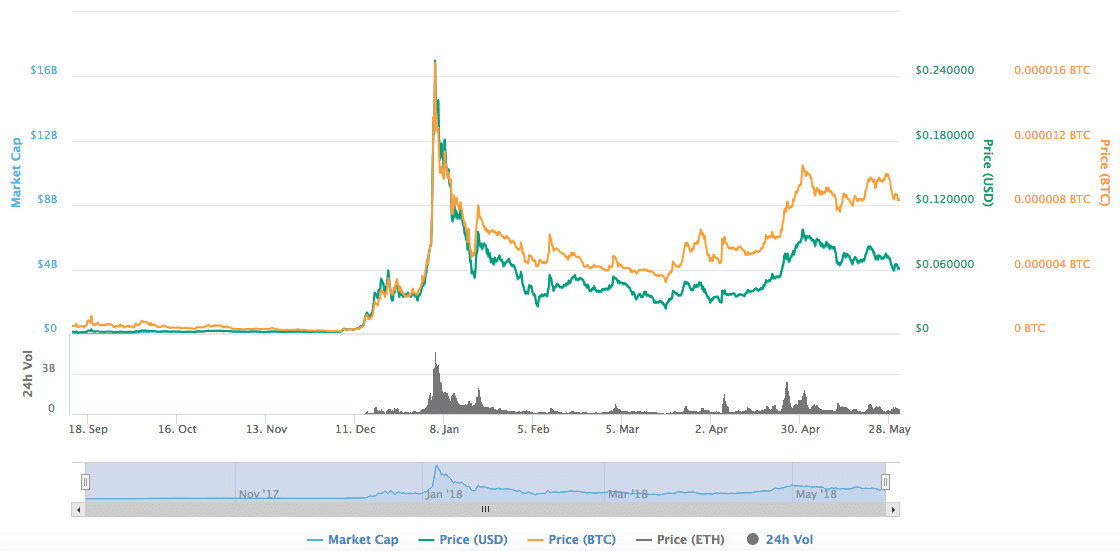
History and About
TRON was founded by Justin Sun in 2017 who is also the current CEO of the company. What distinguishes the entrepreneur from his peers, is his youthful age and rich educational background, having obtained a Masters from the University of Pennsylvania.
Help us make Finance Magnates better!
Apart from Sun, the TRON team features several other key individuals. CTO Lucien Chen far previously employed by Alibaba with masses of experience working with top-tier internet firms such as Netease, Qihoo 360, and Tencent.
TRON is also functioning well by important Chinese developers on its team but is still seeking to continually expand its workforce by employing individuals with great amounts technical knowledge such as Maorong Lin and Xiadong Xie.
Tronix (TRX) is the official token of TRON, which looks to be a decentralized entertainment platform for sharing content with the eventual goal of leveraging blockchain and peer-to-peer (p2p) network technologies. Backed by the non-profit Tron Foundation, based in Singapore, it aims to to take the global entertainment industry – a market with an estimated valuation of $1 trillion.
TRON’s headquarters are based in China, a country with a rather strict take on cryptocurrency regulations. Whilst so far the company has not had any issues and indeed, most of their investments come from wealthy Chinese businessmen (Hitters Hu, Nebulas founder, being one of them). That being said, in a country with an uncertain future regarding crypto, it may be helpful to be wary of this aspect, particularly if the company becomes embroiled in controversy.
How Does it Work?
TRON’s primary purpose is to make the internet a better, more decentralised means which would be done by:
- Freeing data so that is not charged for or controlled by anyone.
- Allowing a content ecosystem where individuals can gain access to digital assets from content spreading
- A personalised ICO with the capability to distribute digital assets
- An Infrastructure which would allow distributed digital assets exchange as well as market forecasting.
The TRON project is one for the long haul, and is split into several inspirationally titled phases that commence with Exodus in 2017 and ultimately look to lead one to Eternity in 2023. The primary features of each step can be seen below:
- Exodus: A free platform for P2P distribution, storage, and content of all types.
- Odyssey: Economic incentives put together to support content creation and empowerment
- Great Voyage: ICO Capabilities on an individual level.
- Apollo: The ability for content producers to provide personal tokens such as the TRON 20 Token.
At this moment, the project is in its first stage: Exodus. Exodus looks to offer simple distributed file sharing built on top of something akin to IPFS. As such, TRON is not actually utilising any form of blockchain technology in its current form. However, this will look to be altered when the project moves into the second stage of its programme.
TRON as an Investment
 coinmarketcap
coinmarketcap
TRON, like most cryptocurrencie,s saw a major spike in its price in December last year, and then witnessed a dip at the start of the year, seeing a recovery in recent months, as can been seen by the chart above.
The coin is available on several major exchanges such as Upbit, Coinbase, Bittrex and Huobi Pro, with more coming soon. The technical value of the coin is not currently reflected in the value of the coin as the project aims to achieve more in the next five years as part of its long term vision.
Recently they launched Troin MainNet as they continue the next stage of their evolutionary journey:
#TRON Mainnet is awake! Our journey to independence begins. Stay tuned to Twitter for the livestream conference in less than 1 hour… #TRX $TRX pic.twitter.com/fs6k3cH7m7
— Justin Sun (@justinsuntron) May 31, 2018
Tron does not have a native wallet specifically but it can be stored on a wallet of your choice such as MyEtherWallet.
Scandals and Controversy
TRON came under criticism at the start of the year for the alleged plagiarism in its ICO whitepaper.
The whitepaper for TRON was published in English, Spanish and Russian translations in January 2018. The paper outlined its foundational beliefs that the internet is not the free, descentralized territory it once was, and that people should have the right to own and control their own data and to disclose info with freedom and by choice.
The whitepaper was accused of plagiarizing the Filecoin and IFPS whitepapers, which were published far before TRON’s. Ethereum founder, Vitalik Buterin mocked the whitepaper’s plagiarism on Twitter in early April:
8. Better white paper writing capability (Ctrl+C + Ctrl+V much higher efficiency than keyboard typing new content)
— Vitalik “Not giving away ETH” Buterin (@VitalikButerin) April 6, 2018
Justin Sun blamed the lack of citations in the document to translation problems which arose due to the fact that the company used volunteer translators. He denies plagiarising or not giving enough attention to said document.

Financemagnates.com is author of this content, TheBitcoinNews.com is is not responsible for the content of external sites.
Our Social Networks: Facebook Instagram Pinterest Reddit Telegram Twitter Youtube










